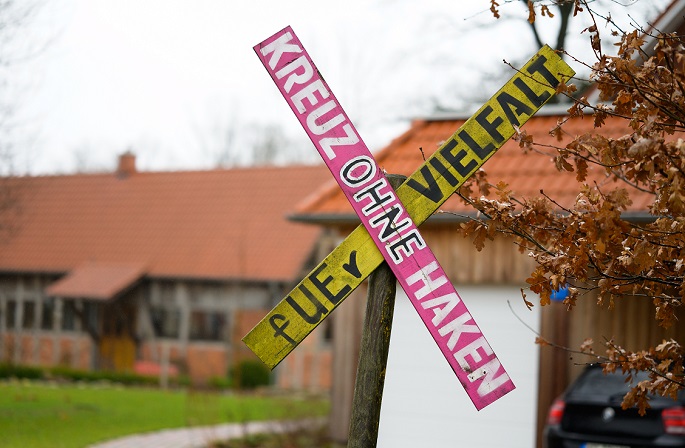Far-right extremists settling in rural Germany
Published : 05 Jun 2023, 23:54
Martin Raabe is more than a bit suspicious about some of his neighbours, although they look fairly neat and tidy.
The pastor from the village of Ebstorf is referring to the members of a group known as "Völkisch settlers" - ethnic settlers - thought to be close to far-right extremists, who have been settling in the Lüneburg area in northern Germany for a while now.
Raabe, who is now retired, has been trying to warn people about the trend for years. Not many locals pay the group much attention - though it is being monitored by the state security services.
Raabe says these people are not to be underestimated, though they may be less visible than other far-right extremists in Germany. "They are not the bomber jacket and shaved-head types, they are very educated people."
What bothers the cleric greatly is their socio-political view of the world. "Do we want women in long dresses again? Their image of women is horrible, it's a step back to the Stone Age," he says.
As people become more aware of the problem, he is now invited to address universities about the issue, and also provides advice to smaller villages.
Raabe also talks to mayors and headmasters because he has noticed time and again that children raised in these groups are simply removed from the local schools at some point, and disappear from sight.
One memory that sticks with him is of a Germanic wedding in the area, in a pagan marriage ritual known as Eheleite in right-wing circles. Visitors travelled to the event from all over Germany, Switzerland and Austria. "It has a strong cult-like character," says Raabe.
He adds that those who leave the scene often end up living in fear and anonymity.
Even though the domestic intelligence service may monitor the communities in the state of Lower Saxony, the size of the group is unclear. Its members tend to keep a low profile, with people living as part of extended families that have been based in the Lüneburg Heide area for generations.
Those structures mean the group is fairly opaque. But it includes people who are connected by the idea of ethnic settlements, a commitment to right-wing extremism and a shared past, according to intelligence.
It is not possible to get a statement from the settlers themselves - even in the past the groups have not spoken out in public.
"These people think in the long term. They want to create a different society and they pursue that goal consistently," says Raabe.
Sure, he concedes people in the rural areas to the south of the port city of Hamburg are fairly conservative but says it goes beyond the racist and misogynistic jokes he sometimes overhears at local pubs. People are starting to get worried by the things they hear, he says.
Raabe has started his own campaign to counter the trend and the threat he sees to his community. He and his group formed in 2018 started putting up prominent yellow and red crosses that stand for diversity, intended as the opposite to a swastika. "Cross without hook - for diversity," some say.
There are now 360 of these crosses that aim to act as warnings on yards and gateways throughout the states of Lower Saxony, Mecklenburg-Western Pomerania and Saxony, Raabe says.
Raabe's group is called "Beherzt," which translates as "courageous," and has around 500 supporters. He is the only signatory - many people are scared, says Raabe. He stands for what he believes, though it means he receives threats, hate mail and late-night phone calls.
Those monitoring the scene say more and more right-wing extremists are settling in rural pockets of Lower Saxony to retreat and network.
Eva Bunn, from a group of counsellors opposing right-wing extremism and promoting democracy, welcomes Raabe's efforts. She says groups like his are making a problem visible that has gone below the radar for too long.
Bunn is trying to promote democratic coexistence in a country where there is concern about hate, racism and anti-Semitism of the past and several kinds of extremist groups in the present.
But in remote areas, the "ethnic settlers" face little opposition and few demands for pluralism and human rights.
Instead, like-minded people meet at traditional celebrations, training courses or military sports exercises. In addition to these events for their own scene, which take place in isolation, some settlers are also involved in village communities and associations, says Bunn.
On the one hand, the newcomers want to isolate themselves, but on the other hand, they are also trying to shape and influence village life.
While other far-right extremists such as neo-Nazis tend to be more visible, like the scene in the nearby city of Braunschweig, for example, Bunn says many of the settler families are not seen much in public. Many have children and claim they are apolitical, she says.
Outwardly, the members are usually friendly, involved in clubs or taking on duties as parents at schools. Home life is strict and the children are highly disciplined. It seems to work, Bunn says. "There are few dropouts."
The police say the "ethnic settlers" are not attracting attention by breaking the law despite their right-wing ideology.
In the districts of Uelzen and Lüneburg, families are under police surveillance even though they don't advocate their views publicly, says Kai Richter, press officer of the Lüneburg police force. But the authorities are watching closely, he adds. "We must not close our eyes, but criminal offences are not known."


